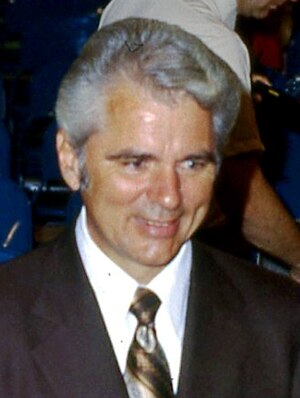Discover Your Roots
SIGN UPDiscover Your Roots
SIGN UPGarner is a gender-neutral name of English origin, meaning "gardener." It may refer to various places in the United States, including Arkansas, Iowa, Missouri, and North Carolina. Additionally, Garner is also a surname and can refer to a granary or a United States Navy minesweeper. The name's roots in English culture reflect its association with gardening and the land. The name carries a sense of connection to nature and the nurturing of plants and green spaces. Whether used as a first name or a surname, Garner symbolizes a connection to the earth and a love for cultivating and caring for the environment.

Garner Ted Armstrong (February 9, 1930 – September 15, 2003) was an American evangelist and the son of Herbert W. Armstrong, the founder of the Worldwide Church of God. He gained recognition as the voice of The World Tomorrow, the church's radio program, and later hosted a television program of the same name in North America. Armstrong's genealogy can be traced back to Edward I of England, and he was the youngest of four children, raised in Eugene, Oregon. After serving in the U.S. Navy during the Korean War, he returned to Pasadena, California, where he enrolled in Ambassador College and eventually completed degrees in theology. Despite being disfellowshipped by his father in 1978, Armstrong was noted for his broadcasting talents, mixing political, economic, and social news with religious commentary and adding "wry humor" into his sermons. He also arranged for country music star Buck Owens to entertain attendees at the church convention and was an ordained minister who made Spanish-language broadcasts of The World Tomorrow. Despite facing setbacks in the 1970s, Armstrong left a lasting impact on religious broadcasting and inspired various artists through his work.




All images displayed on this page are sourced from Wikipedia or Wikimedia Commons.We use these images under their respective Creative Commons or public domain licenses. Wherever applicable, author attributions and license information are provided. If you believe an image is used incorrectly or outside its license terms, please contact us so that we can review and correct the issue.